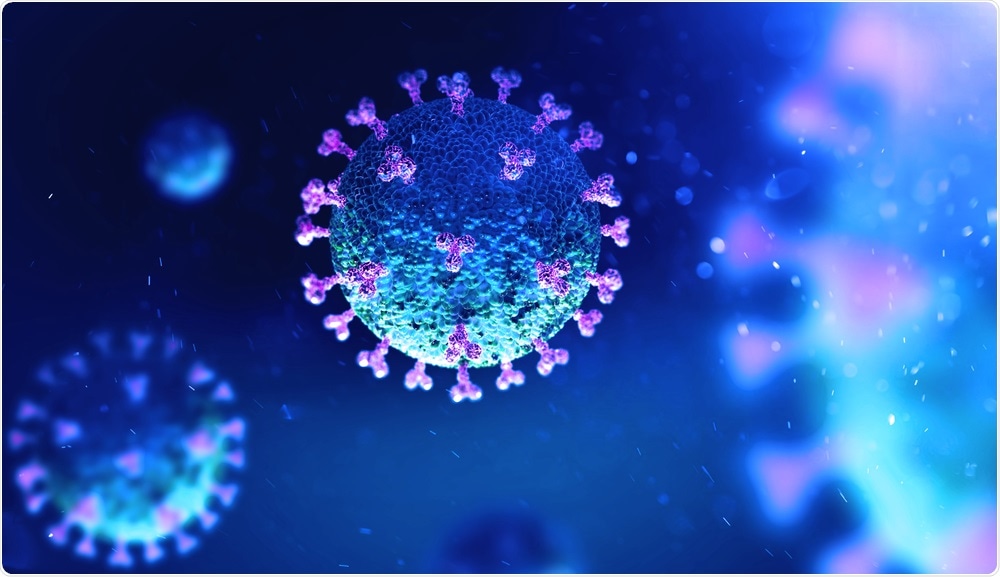Scientists from Emory Health Sciences have been observing an intense stimulation of immune cells in severe cases of COVID-19 disease. This activation of immune cells is similar to acute flares of systemic lupus erythematosus (SLE)—an autoimmune disease.

Image Credit: Andrii Vodolazhskyi/Shutterstock.com
The researchers’ findings indicate tests that could divide certain COVID-19 patients, who require immune-calming treatments from other individuals who may not. The team may also start to describe why certain people infected with SARS-CoV-2 create a large number of antibodies against the virus and still experience poor outcomes.
The study results were published online in the Nature Immunology journal on October 7th, 2020.
The results of Emory’s team converge with the latest results by other researchers, who discovered that high inflammation in COVID-19 may disturb the formation of germinal centers—that is, structures found in lymph nodes where training occurs for antibody-producing cells. The Emory team noted that activation of the B cells is moving forward along an “extrafollicular” pathway outside germinal centers—looking analogous to the one they had seen in SLE.
B cells denote a library of blueprints for antibodies, which can be tapped by the immune system to combat infection. In the case of severe COVID-19, the immune system is actually pulling library books off the shelves and flinging them into a disorganized pile.
Prior to the COVID-19 pandemic, the study’s co-senior author Ignacio (Iñaki) Sanz, MD, and his laboratory were focused on analyzing SLE and how the development of B cells is disrupted by the disease.
Sanz is head of the division of rheumatology in the Department of Medicine, director of the Lowance Center for Human Immunology, and a Georgia Research Alliance Eminent Scholar. Frances Eun-Hyung Lee, MD is the study’s co-senior author and is also an associate professor of medicine and director of Emory’s Asthma/Allergy Immunology program.
We came in pretty unbiased. It wasn’t until the third or fourth ICU patient whose cells we analyzed, that we realized that we were seeing patterns highly reminiscent of acute flares in SLE.”
Ignacio (Iñaki) Sanz, MD, Study Co-Senior Author and Chief of the Division of Rheumatology, Department of Medicine, Emory Health Sciences
In SLE patients, B cells are abnormally stimulated and prevent the balances and checks that generally limit them. This usually results in the synthesis of “autoantibodies” that react against the body’s cells, leading to symptoms, like joint pain, fatigue, kidney problems, and skin rashes. Flares are times when the symptoms become worse.
The Emory group is currently investigating whether severe COVID-19 leads to the production of autoantibodies with clinical consequences. Sanz observed that other scientists have noted autoantibodies in the acute stage of the COVID-19 disease, and it will be significant to figure out whether long-term autoimmune resections are associated with joint pain, fatigue, and other symptoms experienced by certain survivors.
It’s an important question that we need to address through careful long-term follow-up. Not all severe infections do this. Sepsis doesn’t look like this.”
Ignacio (Iñaki) Sanz, MD, Study Co-Senior Author and Chief of the Division of Rheumatology, Department of Medicine, Emory Health Sciences
Sanz added that in lupus, the responses of extrafollicular B cells are characteristics of African-American patients suffering from severe disease. In the new research, African-Americans represented the majority of patients with severe COVID-19 infection. Sanz added that it will be significant to interpret how health-related disparities and underlying conditions drive the quality and intensity of B cell responses in autoimmune diseases as well as COVID-19.
In this study, the researchers compared 10 critically ill COVID-19 patients (four of whom died) admitted to Emory hospitals’ intensive care units to 7 COVID-19 patients, who were treated as outpatients, and 37 healthy individuals.
In the critically ill group, individuals were observed to have higher levels of antibody-secreting cells in the early stage of their infection. Additionally, the antibodies and the B cells made by them exhibited characteristics indicating that the cells were being stimulated in an extrafollicular pathway.
Specifically, the cells experienced fewer mutations in their antibody genes when compared to those observed in a focused immune response, which is usually honed inside germinal centers.
The Nature Immunology article was the outcome of an association across Emory Health Sciences. The co-first authors of the study are Matthew Woodruff, Ph.D., an instructor in Sanz’s laboratory, and Richard Ramonell, MD, a fellow in pulmonary and critical care medicine at Emory University Hospital.
Ramonell observed that the patients who were examined were treated early at the time of the COVID-19 pandemic. This was done before the extensive introduction of the anti-inflammatory corticosteroid dexamethasone, which has been demonstrated to decrease the mortality rate.
The researchers’ findings may settle the argument about which COVID-19 patients should receive immunomodulatory therapies, like anti-IL-6 or dexamethasone drugs. Higher levels of inflammatory cytokines, like IL-6, were also detected in patients with a higher expansion of B cells undergoing extrafollicular activation.
Although drugs given to a few COVID-19 patients push back against IL-6, results have been mixed in clinical trials. Sanz suggested that patients with markers of unregulated immune responses may be suitable candidates for treatment with anti-inflammatory medications targeting the corresponding pathways.
Source:
Journal reference:
Woodruff, M.C., et al. (2020) Extrafollicular B cell responses correlate with neutralizing antibodies and morbidity in COVID-19. Nature Immunology. doi.org/10.1038/s41590-020-00814-z.